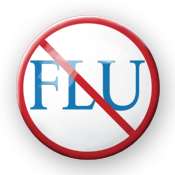The flu is here, and this season it is hitting some communities harder than normal. People on college campuses are especially susceptible because of close living quarters and frequent contact with others in classrooms, jobs and through daily routines. While there is no sure-fire way to prevent getting the flu, there are a few things you can do to minimize your exposure and protect yourself and others should you get sick.
- GET YOUR FLU SHOT: Although you may have heard that this year’s flu shot has not been as effective as anticipated, getting a flu shot provides some protection and can greatly minimize your symptoms if you do get the flu. Campus Health Services still has a large number of flu shots available. Make an appointment online or by calling (928) 523-2131.
- Wash your hands often to prevent the spread of disease.
- Avoid close contact with people who are sick. More importantly, if you think you have the flu, stay home.
- Don’t share food or drinks with other people.
- Cover your mouth and nose—cough and sneeze into a tissue or sleeve to prevent others from getting sick—and immediately wash your hands after coughing or sneezing.
- Eat nutritious food.
- Stay well-hydrated.
- Stay physically active; get exercise.
- Get plenty of sleep.
- Practice stress reduction.
Important things to know:
- The flu is caused by the influenza virus. The flu shot contains an inactive form of the virus that causes your immune system to develop protective antibodies to the virus. This immune response can take up to two weeks, so it is important to get your flu shot as early in the season as possible.
- Since the flu is caused by a virus, antibiotics will not provide a cure. Do not expect to be given antibiotics if you have the flu.
- The common cold and the flu are very different. Cold symptoms are generally milder and usually involve a stuffy or runny nose, sneezing, a mild sore throat and possibly a slight cough. Flu symptoms usually involve fever and chills, body/muscle aches, extreme fatigue, cough, sore throat and headache—you feel much worse. Your health care provider can perform a nasal swab that can help diagnose the flu.



